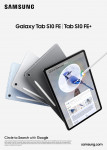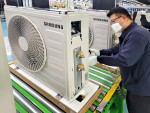Samsung Announces Advanced Multi-standard, Multi-band Mobile TV Chipset
"Although a new market, we see high growth potential in mobile TV applications," said Yiwan Wong, vice president, System LSI Division, Semiconductor Business, Samsung Electronics. "With initial product launch targets for the Europe and Asia markets, we are introducing our high performance mobile TV chipset technology with added feature support to serve the needs of the entire mobile TV industry."
Samsung’s new multi-standard, multi-band mobile TV chipset integrates a broad range of segment standards. As countries worldwide introduce their mobile TV service standards, this chipset allows end users to choose which broadcasting services they want to use without changing their mobile application.
The multi-standard channel decoder, which transforms the analog signal into digital signal in order to restore the image and audio source, is fully compliant to DVB-H/T, T-DMB, DAB, DAB-IP, and ISDB-T 1 segment standards. Samsung applies its advanced 65nm technology for higher performance and cost effectiveness. The high signal reception rate is a core characteristic, which realizes a smooth mobile TV experience even on high-speed trains.
The multi-band RF tuner, which receives the analog broadcast signal, has a simplified circuit structure by applying a low IF to compliment the conventional zero IF. It is also a general purpose tuner that supports UHF, VHF and L-band commonly used in Europe and the United States. The wide use of the RF tuner compliments the advanced performance of the multi-standard channel decoder.
This new chipset is offered either as two standalone ICs or as a system-in-chip package (SiP) which places together the RF tuner and the channel chip on a single module package.
Samsung provides extensive customer support in terms of software, reference platforms, test solutions and extended component line up such as the application processor. The multi level of support decreases the development time needed for the handset and mobile applications designers to create new mobile TV functionalities.
This new mobile TV chipset requires no external low noise amplifier (LNA) and additional memory ICs, significantly reducing the bill-of-materials (BOM) cost of the total system. The chipset supports Link Layer processing to output fully error-corrected IP datagrams or MPEG2 transport streams.
According to market research firm Strategic Analytics the mobile TV market is expected to reach 12 million units in 2007 and 130 million units by 2011 at a compounded annual growth rate of 67 percent.
Samsung’s new multi-standard channel decoder (S3C4F31) and multi-band RF tuner (S5M8602) chipset is now sampling with mass production slated for the fourth quarter of 2007.
About Samsung Electronics
Samsung Electronics Co., Ltd. is a global leader in semiconductor, telecommunication, digital media and digital convergence technologies with 2006 parent company sales of US$63.4 billion and net income of US$8.5 billion. Employing approximately 138,000 people in 124 offices in 56 countries, the company consists of five main business units: Digital Media Business, LCD Business, Semiconductor Business, Telecommunication Network Business, and Digital Appliance Business. Recognized as one of the fastest growing global brands, Samsung Electronics is a leading producer of digital TVs, memory chips, mobile phones, and TFT-LCDs. For more information, please visit www.samsung.com
삼성전자 개요
삼성전자는 반도체, 통신, 디지털 미디어와 디지털 컨버전스 기술을 보유한 글로벌 리더다. 삼성전자는 디지털 어플라이언스 부문, 디지털 미디어 부분, LCD 부분, 반도체 부분, 통신 네트워크 부분 등 5개 부문으로 이뤄져 있다. 세계에서 가장 빠르게 성장하는 브랜드인 삼성전자는 스마트폰, 디지털 TV, 메모리 반도체, OLED, TFT-LCD 분야에서 세계 선두 주자다.
웹사이트: http://www.samsung.com/sec
연락처
Suyeon Chae
tel : 82-2-727-7824
email : 이메일 보내기




